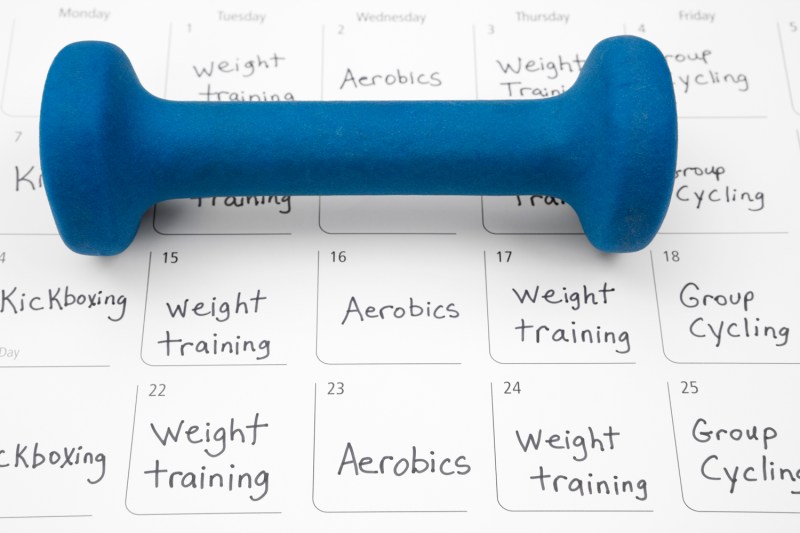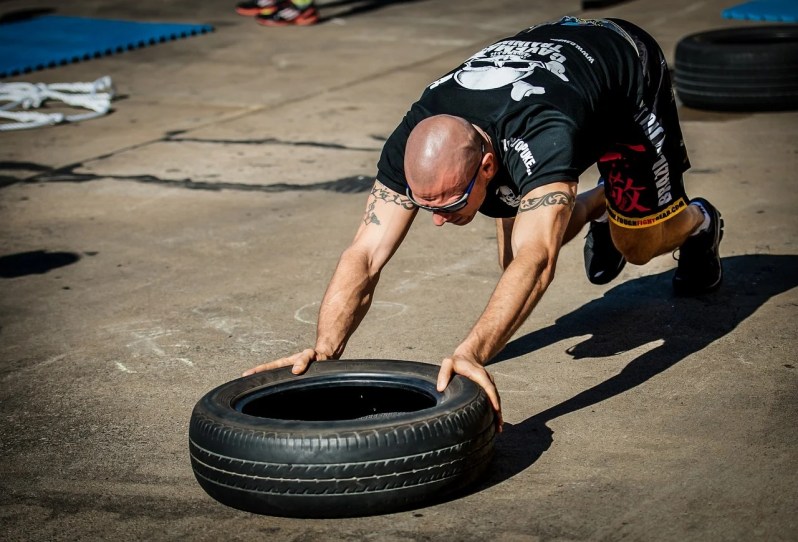 Whether you're new to fitness or already accustomed to exercise, you may still be wondering, "How many days a week should I exercise?" To have oneweekly training scheduledesigned to fit your lifestyle and help you achieve your goals is essential!
Whether you're new to fitness or already accustomed to exercise, you may still be wondering, "How many days a week should I exercise?" To have oneweekly training scheduledesigned to fit your lifestyle and help you achieve your goals is essential!
Contents
- How many days a week should I train?
- Different schedules for different goals
- Is it bad to exercise every day?
- Is training five days a week too much?
- Are short training sessions worth it?
While there is no one-size-fits-all answer to how many days per week you should exercise, we look at the different factors that influence the number of days per week you should exercise and answer frequently asked questions about how to create an exercise program. to follow. below.

How many days a week should I train?
Ultimately, the number of days per week you should exercise depends on several factors, including the following:
- The type of exercise you do:High-impact activities such as running and jumping should normally be performed less frequentlylow impact exercisessuch as cycling, rowing or swimming, because the risk of injury increases if you exercise too often with high-impact activities, especially if you have had previous musculoskeletal injuries.
- Training duration:The longer you train, the fewer days per week you have to train.
- Training intensity:The more vigorously you train, the fewer workouts you need to do per week.
- Fitness Goals:Your health and fitness goals play an important role in how many times a week you should exercise. Suppose you just want to get enough exercise to reduce your risk of heart disease and stroke. In that case, you will probably be able to train fewer days per week than if you want to lose a significant amount of weight or train for an athletic competition.
- The:Older adults may need several days of rest per week to recover from strenuous exercise. To prevent overtraining, it is important to listen to your body and give your body the chance to recover.
- Health status:If you have an illness, musculoskeletal injury, or contraindications to vigorous physical activity, this may affect how often you should exercise.
- Physical activity in your lifestyle outside of your exercise routine:Depending on your fitness and health goals, the more active you are in your daily life in addition to the exercise you get in your designated workouts, the fewer times per week you may need to exercise. For example, someone who works in construction can get away with less training than someone who sits at a desk all day as a secretary.

Different schedules for different goals
How many days a week should I train for the best results?
In an ideal world, you should be training five to six days a week for the best results. These workouts should include a mix of strength training and cardio. The more variety you can add to the types of exercises you do, the better.
Recommended videos
How many days a week should I train to build muscle?
Strength training three to four days a week is usually sufficient to build muscle. You can also train four to five days a week and perform muscle splits on different days (e.g. chest/arms, back/abs, lower body). If you want to build muscle, the intensity of your workouts is more important than the frequency of your workouts. For hypertrophy, lift heavy weights for fewer reps. Nutrition is just as important; make sure you get enough protein and total calories to support muscle growth.
Related
- This is the best training routine for pull days in terms of size and strength
- 5 effective resistance band back exercises to add to your workout
- How to Train for a 5K: What You Need to Know
How many days a week should I exercise to lose weight?
To lose one pound of stored body fat, you need to create a calorie deficit of about 3,500 calories, which equates to 500 calories per day. This calorie deficit can be generated by consuming fewer calories, burning more calories, or a combination of both.
Exercise factors into the calories you burn. However, in general, most people find that they lose weight more effectivelythrough dietary adjustments. That said, exercising four to six days a week is usually sufficient for weight loss, with a goal of at least 150 minutes of moderate-intensity exercise or 75 minutes of vigorous-intensity exercise per week.

Is it bad to exercise every day?
It's not necessarily 'bad' to exercise every day, but it's not necessarily 'good' either. Depending on the type of exercise you do, working out every day can increase your risk of injury, overtraining and burnout. If you want to exercise every day, the key to reducing this is varying the type of exercise you do.
For example, instead of running every day (which is a high-impact activity), you can run four days and do low-impact cross-training on other days. If your focus is on strength training and you want to train every day, do split routines insteadintensive full body trainingto give your muscles a chance to rest and rebuild.
However, it is usually advisable to take at least one day off per week so that your body can fully rest and recover.

Is training five days a week too much?
Not at all! Exercising five days a week is generally ideal for healthsuitability. Make sure you keep your workouts varied so that you use different muscles and put different stress on your body.
Is it enough to exercise 30 minutes a day, five days a week?
Depending on your goals, exercising 30 minutes a day, five days a week may be enough. If your goal is to exercise for your health and longevity, 30 minutes a day for five days a week is perfect. According toCDCadults should aim for 150 minutes of moderate-intensity aerobic exercise, or 75 minuteshigh-intensity aerobic exerciseper week to reduce the risk of lifestyle diseases.
The recommended 150 minutes of moderate-intensity exercise is 30 minutes per day, five days per week. However, keep in mind that these CDC guidelines pertain to cardio and they recommend two additional full-body strength training sessions per week. That said, if your workout includes a combination of both, or if you're closer to the "vigorous" intensity category, you'll meet more than the minimum health recommendations by exercising for 30 minutes five days a week.
On the other hand, if you want to lose weight or improve your performance, you may need to exercise more.

Are short training sessions worth it?
We understand it. There are days when you simply don't have time for a 30-minute workout. This can lead to the thought: “I only have 10 minutes; it's not worth the training.”
Yes that is true. Every exercise, regardless of length, will have some health and fitness benefit. While short workouts aren't best for long-term goals like weight loss, they can be good for kick-starting an exercise program, especially for someone who leads an overly sedentary lifestyle, as long as the goal is to extend exercise sessions. the training program continues. If you're on the go, a quick 10-minute workout can be a great way to start your day and help you focus.
Editorial recommendations
- 7 exercises that target the deep core (and what that really means)
- 3 great steady-state cardio exercises to incorporate into your fitness routine
- Does sprinting build muscle? 3 effective training programs to try
- Strength Training Tips: Here's What—and When—You Should Eat
- What's the point of working out in a hoodie? We explain